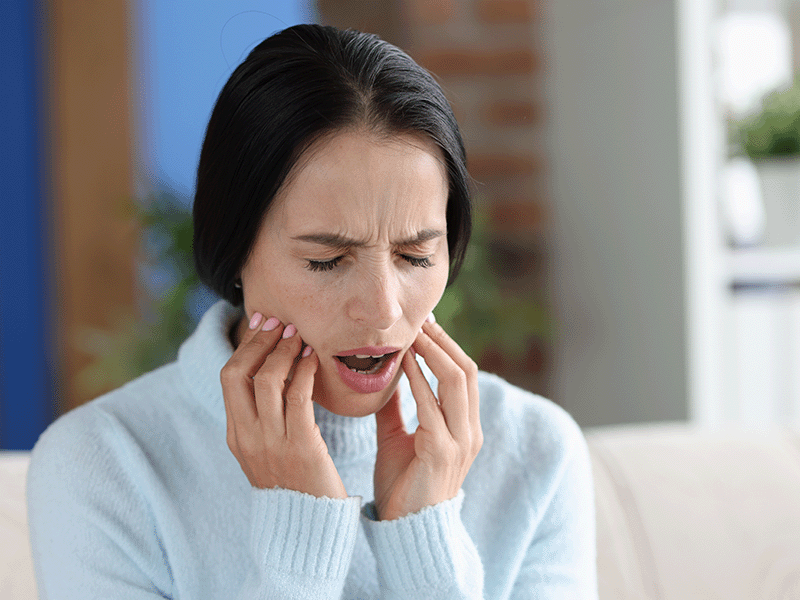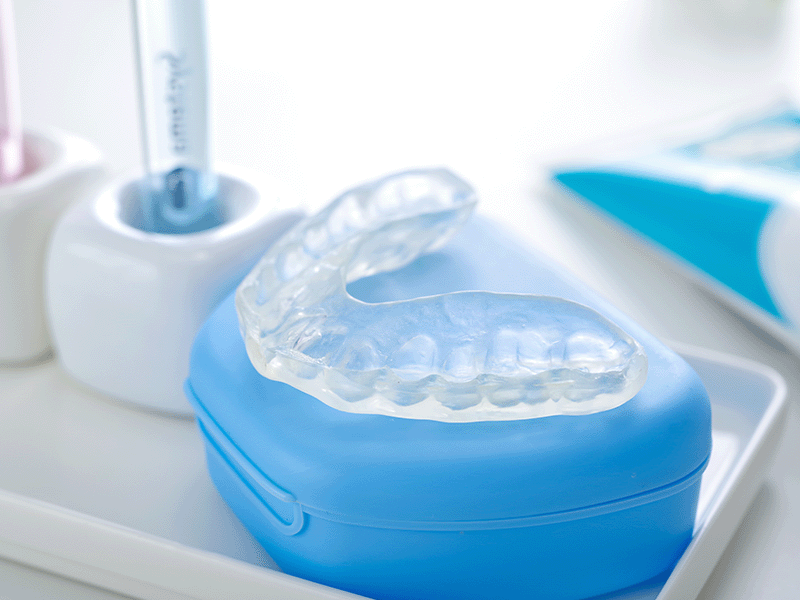Treatment for Teeth Grinding and Clenching
What Are the Effects of Teeth Grinding and Clenching?
Teeth grinding and clenching are unconscious habits that affect many people, but their impact should not be underestimated.
Chronic grinding or clenching can lead to tooth wear, fractures, tooth sensitivity, temporomandibular joint disorder (TMD), and even general health issues such as stiff shoulders and headaches.
If you wake up with jaw fatigue, experience tooth sensitivity, or suffer from severe shoulder stiffness, teeth grinding or clenching may be the cause.
In some cases, symptoms may also be related to "tooth contact habits"—a condition where the upper and lower teeth touch unconsciously during the day.
At Sakura Clinic, we offer appropriate treatments tailored to each patient’s condition, helping to minimize the negative effects of teeth grinding and clenching.

Types of Teeth Grinding and Clenching
Teeth grinding and clenching can generally be classified into the following three types.
- Grinding – A type of bruxism where the teeth are rubbed together with a grinding motion.
- Clenching – A strong biting or jaw-tightening habit, commonly referred to as jaw clenching.
- Tapping – A less common type where the teeth are rapidly tapped together with a clicking sound.
If these habits persist, they can affect not only the teeth, but also the jaw, facial structure, and even overall health.
Symptoms Caused by Teeth Grinding and Clenching
Effects on the Oral Cavity
- Tooth wear, fractures, and cracks
- Tooth sensitivity (especially to cold stimuli)
- Loose teeth and worsening of periodontal disease
- Damage to fillings and crowns
Effects on the Jaw Joint and Facial Area
- Temporomandibular joint disorder (pain when opening the mouth, clicking or popping sounds in the jaw)
- Facial asymmetry due to imbalanced muscle use
- Changes in facial shape caused by overdevelopment of the chewing muscles (masseter muscles)
Systemic Effects
- Headaches, shoulder and neck stiffness
- Lower back pain and poor posture
- Decreased sleep quality and fatigue
Treatment Method: Splint Therapy (Mouthguard Treatment)
While it may be difficult to completely stop teeth grinding and clenching, splint therapy (mouthguard treatment) is an effective way to reduce their harmful effects.
What Is Splint Therapy?
Splint therapy is a treatment method that involves wearing a custom-made mouthguard (night guard) during sleep to reduce damage caused by teeth grinding and clenching.
By creating a proper space between the upper and lower teeth and preventing direct contact, the mouthguard helps reduce stress on the teeth and temporomandibular joints (TMJ).

Features of Splint Therapy
- Prevents tooth wear and fractures
- Reduces strain on the jaw and lowers the risk of temporomandibular joint disorder (TMD)
- Relieves muscle tension, potentially improving headaches and shoulder stiffness
- Custom-made mouthguard provides a comfortable fit
Prevention and Management in Daily Life
In addition to splint therapy, making conscious efforts to reduce teeth grinding and clenching in daily life is also important.
- Stress management – Make time to relax and avoid accumulating stress
- Keep your teeth apart consciously – Prevent tooth contact habits by developing awareness to keep upper and lower teeth slightly apart
- Limit hard foods – Avoid placing excessive strain on the jaw
- Improve posture – Poor posture, such as slouching, can increase pressure on the jaw
- Exercise regularly – Helps relieve muscle tension and promote relaxation

Teeth grinding and clenching are often unconscious habits, but if left untreated, they can affect not only your oral health but also your overall well-being. Early intervention is important if you notice any symptoms.
At our clinic, we offer custom-made splint therapy (mouthguards) tailored to each patient’s needs, helping to reduce the strain on your teeth and jaw.
If you’re concerned about teeth grinding or clenching, please feel free to consult with us.
Click Here to Book an Appointment
If you have any concerns about your health or oral condition,
please feel free to consult Sakura Clinic, a Japanese medical and dental clinic in Dubai.
